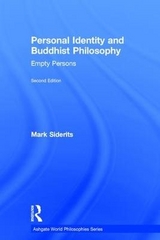
Personal Identity and Buddhist Philosophy
Empty Persons
Seiten
2003
Ashgate Publishing Limited (Verlag)
978-0-7546-3473-7 (ISBN)
Ashgate Publishing Limited (Verlag)
978-0-7546-3473-7 (ISBN)
- Titel erscheint in neuer Auflage
- Artikel merken
Zu diesem Artikel existiert eine Nachauflage
The philosophical problem of personal identity has been the subject of debate in both Western and Buddhist philosophy. This book initiates a conversation between the two traditions showing how concepts and tools drawn from one philosophical tradition can help solve problems arising in another.
What does it mean to be a person? The philosophical problem of personal identity has been the subject of much debate in both Western philosophy and Buddhist philosophy. This book initiates a conversation between the two traditions showing how concepts and tools drawn from one philosophical tradition can help solve problems arising in another, particularly as regards the philosophical investigation of persons. The recent controversy over personal identity has concerned reductionism, the view that persons are mere useful fictions. Mark Siderits explores the most important objections that have been raised to reductionism, and shows how some key arguments and semantic tools from early Buddhism can be used to answer those objections. Buddhist resources are used to examine the important ethical consequences of this view of persons. The second half of the book explores a new objection to reductionism about persons that originates in Mahayana Buddhist philosophy.
What does it mean to be a person? The philosophical problem of personal identity has been the subject of much debate in both Western philosophy and Buddhist philosophy. This book initiates a conversation between the two traditions showing how concepts and tools drawn from one philosophical tradition can help solve problems arising in another, particularly as regards the philosophical investigation of persons. The recent controversy over personal identity has concerned reductionism, the view that persons are mere useful fictions. Mark Siderits explores the most important objections that have been raised to reductionism, and shows how some key arguments and semantic tools from early Buddhism can be used to answer those objections. Buddhist resources are used to examine the important ethical consequences of this view of persons. The second half of the book explores a new objection to reductionism about persons that originates in Mahayana Buddhist philosophy.
Mark Siderits, Illinois State University, USA
Contents: Situating reductionism; Refuting the self; Getting impersonal; Wholes, parts and supervenience; Ironic engagement; Establishing emptiness; Empty knowledge; The turn of the true; Empty persons.
| Erscheint lt. Verlag | 28.9.2003 |
|---|---|
| Reihe/Serie | Ashgate World Philosophies Series |
| Sprache | englisch |
| Maße | 156 x 234 mm |
| Gewicht | 618 g |
| Themenwelt | Geisteswissenschaften ► Philosophie ► Geschichte der Philosophie |
| Geisteswissenschaften ► Philosophie ► Östliche Philosophie | |
| Geisteswissenschaften ► Philosophie ► Philosophie der Neuzeit | |
| Geisteswissenschaften ► Religion / Theologie ► Buddhismus | |
| ISBN-10 | 0-7546-3473-6 / 0754634736 |
| ISBN-13 | 978-0-7546-3473-7 / 9780754634737 |
| Zustand | Neuware |
| Haben Sie eine Frage zum Produkt? |
Mehr entdecken
aus dem Bereich
aus dem Bereich
die kolonialen Wurzeln der französischen Theorie
Buch | Hardcover (2024)
Matthes & Seitz Berlin (Verlag)
CHF 41,90
eine Geschichte der Zuversicht von Homer bis zum Klimawandel
Buch | Hardcover (2024)
C.H.Beck (Verlag)
CHF 39,20



